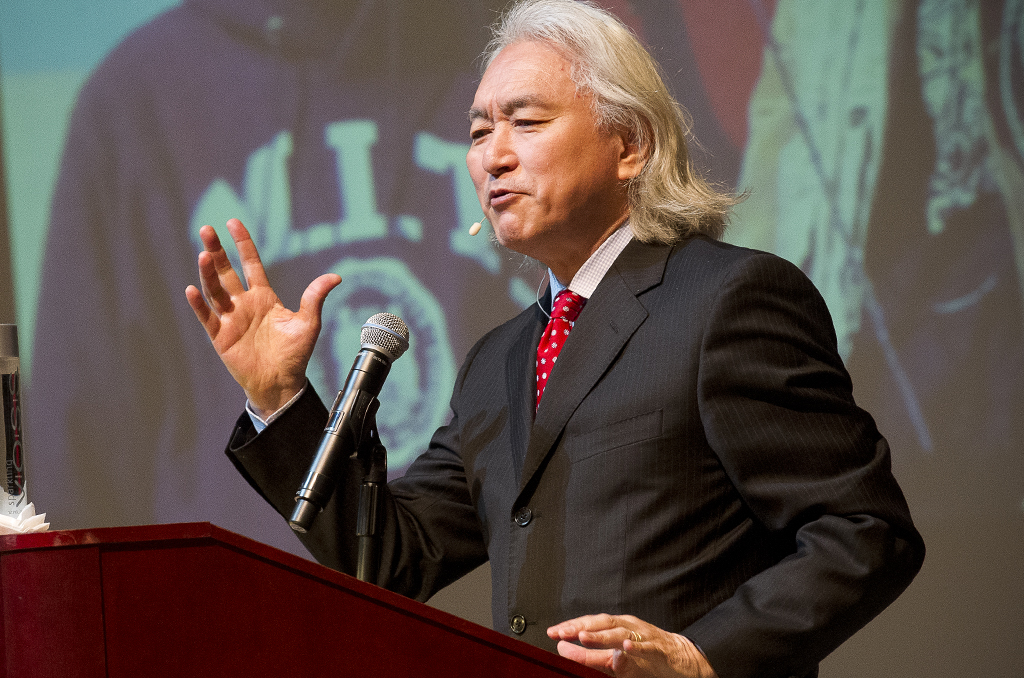Predicting the future is difficult — but not impossible, says Dr. Michio Kaku.
It helps, the renowned physicist told a crowd of more than 500 people at Valencia College, to know what scientific advances are right around the corner.
For instance, Kaku — host of several science TV series and documentaries — predicts that laptop computers and personal computers will eventually be found only in museums. That’s because in coming years, most of us will use our cell phones and disposable computers that we’ll toss out after a few uses, thanks to microchips that will cost about one cent.
In addition, we’re not far from a future in which we’ll wear special eyeglasses that will allow us to view the world with computerized information laid on top of what we’re looking at. Much like the scene in “The Terminator,” in which Arnold Schwarzenegger sees John Conner and his computerized eye layers John’s biographical information on top of his image. That kind of technology would prove useful, he said with a laugh, “when you’re looking for a job and you’re at a cocktail party and you want to know which bigwig to suck up to.”
How does Kaku know that these inventions are on the way? Thanks to his work for British Broadcasting Company and the Science Channel, Kaku gets to interview leading scientists around the country — and uses his books and TV shows to share their work. The U.S. Army, for instance, has already developed an “intelligent eyepiece” that flips down from a soldier’s helmet and feeds him information on the battlefield. Likewise, he has interviewed a scientist who is using tissue engineering to “grow” replacement heart valves for kids who have defective heart valves.
In his latest book, Physics of the Future: How Science will Change Daily Life by 2100, Kaku explores this territory. And at his speech, he painted a picture of a dramatically different world.
Within eight years, he says, Google executives believe they’ll have “driver-less cars” available for the mass market. These cars, which navigate by GPS, could eliminate traffic accidents, he said. “This car does not fall asleep, it does not get distracted, and it does not experience road rage,” Kaku said.
Cell phones will change too, and will feature flexible, intelligent screens — which are much bigger than current screens and will enable people with fat fingers to type better.
Worried about accidents and your ability to call for help? Not a problem. The clothes of the future will be embedded with computer chips that will notify 911 if you are knocked unconscious — and provide paramedics with your location and coordinates.
Our homes will change too — with walls that are covered with smart wallpaper, which can serve as a changeable background, or a movie screen and enormous interactive monitor for Internet surfing. “You’ll go to the wallpaper and say, ‘I want to talk to a doctor.’ And it will produce a Robot Doctor who can answer most of your questions about 90 percent of the time,” Kaku said. Want a date on a Saturday night? Talk to the wallpaper, Kaku says.
“You’ll say, ‘Mirror, mirror on the wall. Who’s available?’ And the wall will contact other people who are also staring at their walls.
But the most profound revolution, he says, is bound to come in medicine and health care.
Already doctors are exploring the uses of “smart pills,” which could make the colonoscopy of the future as simple as swallowing a pill that contains a tiny video camera. Cancer treatment will change radically as doctors move away from chemotherapy and toward using nanoparticles that will hunt down and kill cancer cells in the body one by one. And even the toilets of the future will be smart enough to analyze a person’s urine and feces regularly — and will likely catch signs of disease long before symptoms appear.
Scientists are already using people’s tissues to grow skin for them, but in the future, if you need an organ transplant, doctors will grow a new one for you, using your own cells. “When people get arthritis in the future, we’ll grow new joints for them.” The technique is already being used for some organs and, next up, he said, is the liver.
And at some point, MRI machines will become so miniaturized that we’ll all own one the size of a cell phone — and keep it in our medicine cabinets!
Kaku, who appeared as part of Valencia’s Humanities Speakers Series, signed autographs after his speech — and more than 300 people waited in line for his autograph.
“I read his book, ‘Hyperspace,” when I was about 16 and it inspired me to study math,” said Valencia pre-engineering student Levar Burton. “So this was very exciting for me — to get a chance to meet someone who inspired me as a kid.”
Julio Gonzalez-Zuluaga, another pre-engineering student at Valencia, said he was more pessimistic about the future than Kaku, but still found his speech inspiring. “You need big ideas that are related to your coursework to help inspire you,” said Gonzalez-Zuluago. “There are times when you wonder if you’re going to be nothing more than a grunt engineer, but these ‘big ideas’ inspire you to hope that you may help develop some of this revolutionary technology.”

Comments are closed.